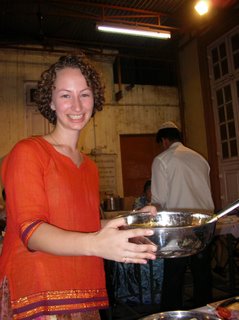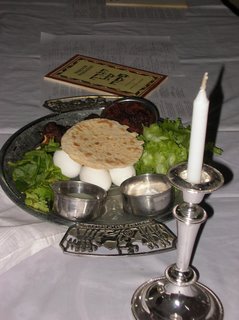Bananas & Dates: Ladies Camp in Lonavla
Bombay Ladies Camp Packing List, April 2006
4 large plastic buckets for tie-dye
One newsprint-wrapped package of rubber bands
9 packets of fabric dye
Good sense of humor
Clothespins and string
50 batata wada potatoes sandwiches
Various fried snacks and sweets
Endless mini-cups for chai
Israeli dancing knowledge
35 white scarves
Patience
Kiddush and Shabbat supplies:
Wine
2 kgs. Kadjoor Dates
2 bunches small sweet Kela bananas
Marathi transliterated Siddur
White and blue Shabbat candles
My henna-stained hands keep distracting me as I type this entry on my computer. Still a bit tired from the weekend away with the ladies, I keep recollecting small moments from the four day retreat.
We arrived startlingly on time in Lonavala on Thursday, spending the afternoon traveling through the hill station up to a lookout point. About 25 women, between the ages of twenty to seventy-five, sang Hindi songs on the bus ride, goofed around like school girls.
Shabbat prayers were led by a daughter and granddaughter of noted Bombay Chazzan (prayer leader) of Bombay, who finally had a chance to lift her voice in prayer. The women covered their hair with mutli-colored scarves which we had made that afternoon, and each one greeted one another in the Sephardic style, shaking hands and bringing ones fingers to ones lips: Shabbat shalom, a Sabbath of peace.
Kiddush also was led by a woman, saying the blessing over small Kela (bananas) and sticky sweet Kadjoor (dates), as is the Bene Israel custom here.
Spontaneous dancing began before dinner, outdoors. A circle within the circle of 'Hava Nagila's. One holding up her folds of Saree, another one tying her dupata scarf across her chest like a sporty schoolgirl, a flash and glint of silver anklets and toerings on the many bare feet.
A different night we slathered Wet, cold Henna onto hands, in different patterns. We squeezed lime juice and sugar onto the mixture, deepening the Mehendi color. One woman, Mozel, recreated the Bene Israeli Indian engagement ceremony, moving her hands from my hips to my shoulders thrice in succession, pretending to feed me sweets.
And on Sunday, many months after first meeting her on the Golden Age Retreat, I Finally heard Mrs. Hannaibai – dynamic seventy five year old, white skinned lady- speak English! We decided I would only speak with her in Hindi, and she would show me her english, laughing with me at my mispronounciations.
A particularly impressive highlight of our retreat was the 'Drama of Ruth' activity that began upon our first afternoon at camp on Thursday and finished on Saturday. I had photocopied out the story of Ruth for each woman in english and marahti, and split them up into small groups to preform. Each Act surpassed the one before it, with the women taking different perspectives on the story, focusing at times on the dramatic and comedic aspects of the story.
Wrapping sarees and scarves into costumes and drawing mustaches and goatees to act out different scenes from the book of Ruth, the women learned and lived the story of Ruth and her Mother-in-law, Naomi, who returned back to the land of Israel together after losing their husbands. My favorite session of the camp was the discussion following act six, in which the woman found modern day meanings in the story of Ruth, debated the worthiness of the messages of the story, and related the actions of the characters to life today in their community. The women praised Naomi, the mother in law who assisted her widowed daughter in law in remarrying. They particularly were fond of Boaz, who took Ruth in, cared for her, and married her despite her widowed status. They grasped the story in its entirety and made it their own, taking the messages to heart and relating them to their own experiences. It was incredible.
The memories I take home with me, are these discussions and each individual woman's smiles. Goofy don’t-care-whose-looking grins on rounded faces. Belly laughter, teasing, poking, and hugging. Letting one another speak. Feeling safe to share, cry, raise a voice, ask, remain silent, pray and bless one another. And fully enjoy a weekend together.




